Complete 2022 Hugo Voting
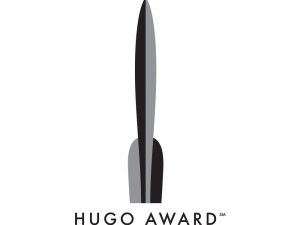 Chicon 8, the 80th World Science Fiction Convention, received 2,235 valid ballots (2,230 electronic, five paper), down from 2,362 at DisCon III, Worldcon 79. There were 1,368 valid nominating ballots (1,366 electronic, two paper), up from 1,249.
Chicon 8, the 80th World Science Fiction Convention, received 2,235 valid ballots (2,230 electronic, five paper), down from 2,362 at DisCon III, Worldcon 79. There were 1,368 valid nominating ballots (1,366 electronic, two paper), up from 1,249.
The procedure for counting nominations remains the ‘‘E Pluribus Hugo’’, or EPH, system. The rather complicated point system gives a single point to each voter’s ballot, dividing that point among the nominees. The points are counted, the two nominees with the fewest points are compared, and (points notwithstanding) the one with the fewest nominations (votes) is dropped. The process repeats until down to six finalists; the last position on the ballot is determined strictly by votes unless there’s a tie. This system complicates discussing how close a runner-up was to making the ballot, as some nominees might have eliminated others earlier on if they’d had just a few more points. In past years, we have done our best to summarize how close it was; this year, the official nomination statistics included their own determination of the margin by which the last place on the final ballot was decided, in some cases using the number of ‘‘bullet votes’’ – nominating votes on ballots with only one nominee in the category – the closest runner-up needed to make the ballot.
Once again, it’s time to explain the Australian ballot preference system used for the Hugo Awards. First-place votes (including those for No Award) are counted in column one. If no entry has the majority of the vote then the entry with the fewest votes is dropped (e). The dropped entry’s second-place votes now become first-place votes (column two) and the process is repeated until a nominee has a majority of the votes (usually six drops, with six finalists), deciding first place. Second place is determined by dropping the winner, counting their second-place votes as if they were first, etc. Therefore, the item that originally placed second doesn’t necessarily win second place. Likewise, third place is decided by dropping both first- and second-place winners, promoting the next eligible entry, and counting all over again. The system ensures that the winner is liked by a majority of voters, even though it may not have received a majority of first-place votes.
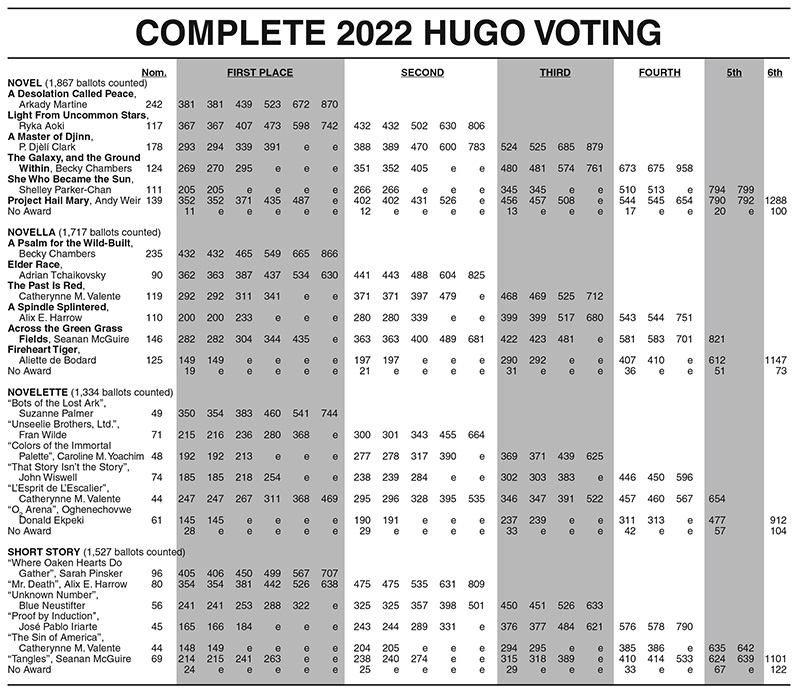
BEST NOVEL
A Desolation Called Peace by Arkady Martine won without much challenge, coming in with the most nominations, the most first-place votes, and led all the way through the voting to take the Hugo in six rounds. Light From Uncommon Stars by Ryka Aoki then led all the way in voting for second place, taking it in five rounds. A Master of Djinn by P. Djèlí Clark took third in similar fashion, followed by The Galaxy, and the Ground Within by Becky Chambers in fourth, She Who Became the Sun by Shelley Parker-Chan in fifth, and Project Hail Mary in sixth. Perhaps the Stars by Ada Palmer was the closest runner-up to the ballot, needing five more bullet votes to make the ballot. This was Martine’s second Hugo Award nomination and second win.
BEST NOVELLA
Becky Chambers’s A Psalm for the Wild-Built started with a big lead in nominations and a solid lead in first-place votes, and held on to win in six rounds. Adrian Tchaikovsky’s Elder Race, which only made the ballot when Martha Wells declined nomination for Fugitive Telemetry, then led all the way in voting for second place, taking it in five rounds. Catherynne M. Valente’s The Past Is Red then took third in four rounds without challenge. Fourth saw more of a contest, with Seanan McGuire’s Across the Green Grass Fields leading in the first two rounds, only to see Alix E. Harrow’s A Spindle Splintered pick up enough votes when Aliette de Bodard’s Fireheart Tiger dropped to surge into the lead to win in the third round. The McGuire then took fifth in one round, leaving the de Bodard to follow in sixth. The closest runner-up to the ballot was Comfort Me With Apples by Catherynne M. Valente, which would have needed nine bullet votes to make the ballot. This was Chambers’s sixth Hugo Award nomination, and second win.
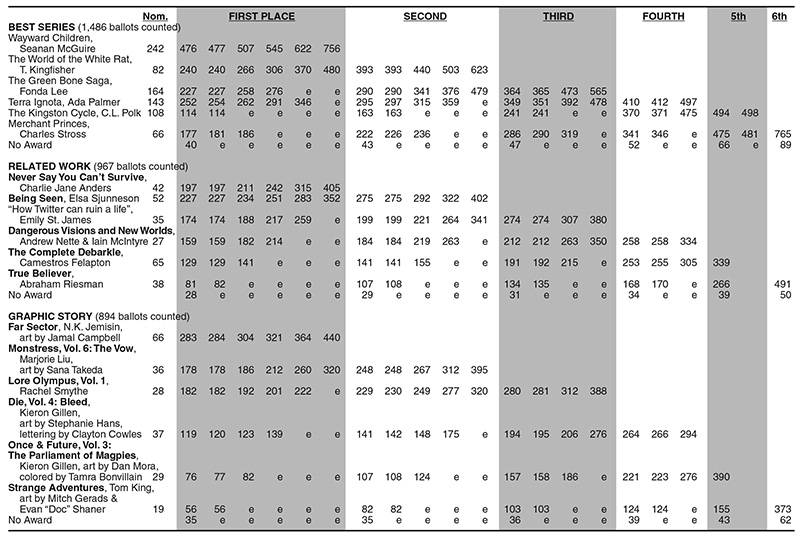
BEST NOVELETTE
‘‘Bots of the Lost Ark’’ by Suzanne Palmer led the voting for first place from the first round and never faced a serious challenge, winning in six rounds. ‘‘Unseelie Brothers, Ltd.’’ by Fran Wilde started the voting for third with a slim five-point lead over ‘‘L’Esprit de L’Escalier’’ by Catherynne M. Valente; that lead expanded in the fourth and fifth rounds, giving the Wilde second place. ‘‘Colors of the Immortal Palette’’ by Caroline M. Yoachim led all the way to take third in four rounds. Fourth place was a bit of a contest, with the Valente leading through the first two rounds, only to have ‘‘That Story Isn’t the Story’’ by John Wiswell (which came in with the most nominations) pull ahead and take fourth in the third round. The Valente then took fifth in one round, and ‘‘O2 Arena’’ by Oghenechovwe Donald Ekpeki ended up in sixth. The closest runner-up to the ballot was ‘‘Mulberry and Owl’’ by Aliette de Bodard, which needed two more votes to make the ballot. This was Palmer’s second Hugo Award nomination, and second win.
BEST SHORT STORY
Sarah Pinsker’s ‘‘Where Oaken Hearts Do Gather’’ won easily, having the most nominations and starting with the most first-places in the first round, never facing serious challenge through the usual six rounds. Alix E. Harrow’s ‘‘Mr. Death’’ took second place in similar fashion in five rounds, Blue Neustifter’s ‘‘Unknown Number’’ led all the way through four rounds to take third, José Pablo Iriarte’s ‘‘Proof by Induction’’ took fourth place without challenge in three rounds, ‘‘The Sin of America’’ by Catherynne M. Valente took fifth in two rounds, and ‘‘Tangles’’ by Seanan McGuire ended up in sixth place. The closest runner-up, Aimee Ogden’s ‘‘The Cold Calculations’’, would have needed two more bullet votes to make the ballot. Pinsker now has six Hugo nominations and two wins.
BEST SERIES
Seanan McGuire’s Wayward Children series came in with the most nominations and a big lead in first-place votes in the first rounds and won without any real challenge in six rounds. The rest of the places also went without notable contest: T. Kingfisher’s series The World of the White Rat took second in five rounds, Fonda Lee’s series The Green Bone Saga snagged third in four rounds, Ada Palmer’s Terra Ignota series claimed fourth in three, C.L. Polk’s series The Kingston Cycle got fourth in two, and Charles Stross’s Merchant Princes followed in fifth. The closest runner-up was McGuire’s Incryptid series, which would have required two more bullet votes to make the ballot. Overall, McGuire has 21 Hugo Nominations and five wins, with four nominations and two wins just this year; this is her sixth nomination for Best Series, and first win in the category.
BEST RELATED WORK
Never Say You Can’t Survive by Charlie Jane Anders won, despite being second in first-place votes in the first round behind Being Seen by Elsa Sjunneson, which held onto the lead through four rounds of voting. Only after The Complete Debarkle by Camestros Felapton dropped did Anders pick up enough votes to jump into the lead in the fifth round, winning in the sixth. The Sjunneson then led all the way in the voting for second place, taking it in five rounds. ‘‘How Twitter can ruin a life’’ by Emily St. James took third place with similar ease, followed by Dangerous Visions and New Worlds by Andrew Nette & Iain McIntyre, which held onto a slim lead over the Felapton to take fourth in three rounds. Felapton’s The Complete Debarkle took fifth place in a single round; it came in with the most nominations, clearly popular with people interested in the Hugo voting process and the Sad/Rabid Puppies campaigns it describes, but apparently lacking more general appeal. True Believer by Abraham Reisman then followed in sixth place. The closest runner-up to the ballot was Roger Zelazny by F. Brett Cox, four votes from making the ballot. Anders now has seven Hugo Award nominations and five wins, two nominations and wins this year.
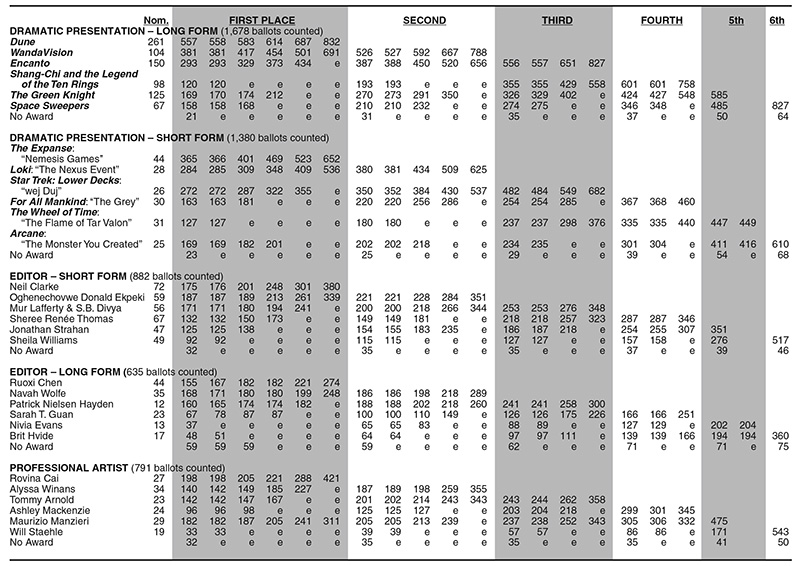
BEST GRAPHIC STORY
Far Sector, written by N.K. Jemisin and illustrated by Jamal Campbell, started with the most nominations and the most first-place votes, and held onto the lead to take the prize in six rounds. Monstress, Vol. 6: The Vow, written by Marjorie Liu with art by Sana Takeda, had a closer contest, but still led all the way in voting to take second place; Lore Olympus, Vol. 1 by Rachel Smythe took third without challenge, and similarly fourth went to Die, Vol. 4: Bleed by Kieron Gillen with art by Stephanie Hans and lettering by Clayton Cowles. Once & Future, Vol. 3: The Parliament of Magpies by Kieron Gillen with art by Dan Mora and colored by Tamra Bonvillain then took fifth place in a single, decisive round, and Strange Adventures by Tom King with art by Mitch Gerads & Evan ‘‘Doc’’ Shaner landed in sixth place. The original leader in nominations, Ghost-Spider, Vol. 2: Party People by Seanan McGuire, with art by Ig Guara, was determined to be ineligible as having been published in December 2020. The closest runner-up to the ballot was The Girl from the Sea by Molly Knox Ostertag, which would have needed one more vote to make the ballot.
BEST DRAMATIC PRESENTATION – LONG FORM
Dune won easily, having started with the most nominations and a big lead in first-place votes, and kept the lead through six rounds of voting. WandaVision (the series) then led all the way in voting to take second place in five rounds, Encanto took third in similar style, and Shang-Chi and the Legend of the Ten Rings picked up fourth place without contest. The Green Knight needed only one round to take fifth, leaving Space Sweepers to take sixth. The closest runner-up was Spider-Man: No Way Home, two votes away from making the ballot.
BEST DRAMATIC PRESENTATION – SHORT FORM
The Expanse: ‘‘Nemesis Games’’ had an easy victory, coming in with the most nominations and a solid lead in first-place votes, going on to win in six rounds. Loki: ‘‘The Nexus Event’’ led all the way in voting for second place, taking it in five rounds. The rest of the places went in similar fashion: Star Trek: Lower Decks came in third, For All Mankind: ‘‘The Grey’’ fourth, The Wheel of Time: ‘‘The Flame of Tar Valon’’ fifth, and Arcane: ‘‘The Monster You Created’’ sixth. WandaVision: ‘‘Previously On’’ got 32 nominations to make the list, but since the parent series had considerably more votes in the Dramatic Presentation – Long Form category, the administrators dropped the episode. That made Loki: ‘‘Journey Into Mystery’’ the closest runner-up, needing only one more vote to make the ballot.
BEST EDITOR – SHORT FORM
This was one of the categories where first place was a bit of a fight. Neil Clarke started with the most nominations, but Oghenechovwe Donald Ekpeki had the most votes in the first two rounds. Only after Sheila Williams dropped did Clarke pull into the lead in the third round, holding on to win the Hugo in the sixth. Ekpeki then led all five rounds of voting for second place. Mur Lafferty & S.B. Divya went unchallenged in the voting for third, taking it in four rounds; Sheree Renée Thomas similarly took fourth place. Jonathan Strahan then snagged fifth place in a single round, and Williams ended up in sixth. Scott H. Andrews, the closest runner-up to the ballot, would have needed six more bullet votes to make the ballot. This is Clarke’s 14th Hugo Award nomination and fourth win overall, and his tenth nomination and first win in this category.
BEST EDITOR – LONG FORM
Ruoxi Chen won after an initial skirmish, coming in with the most nominations, but starting out the first round third in first-place votes, behind leader Navah Wolfe and Patrick Nielsen Hayden. In the second round, Chen pulled two votes ahead of Nielsen Hayden, and then managed to edge into the lead in the third round, and held on to win in the sixth. Nielsen Hayden had a slim lead in the first three rounds of voting for second place, but Wolfe tied him in the fourth round, and pulled ahead in the fifth round to take second place. Nielsen Hayden then dominated all four rounds of voting for third. Sarah T. Guan led all the way to take fourth, Nivia Evans took fifth without a fight, and Brit Hvide came in sixth. A lot of nominees dropped out; Toni Weisskopf declined nomination, and Lee Harris, Diana M. Pho, Liz Gorinsky, and Devi Pillai all declared themselves ineligible for this category. That left K.B. Spangler, Carl Engle-Laird, and Oliver Johnson tied for runner-up to the ballot, each just one bullet vote away from making the ballot.
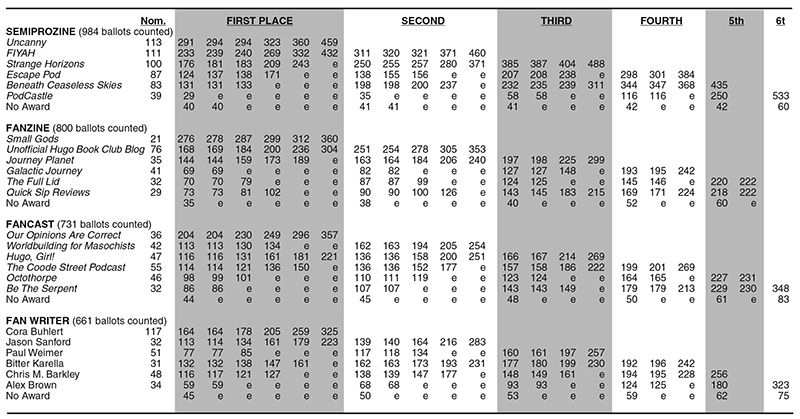
BEST PROFESSIONAL ARTIST
Rovina Cai took the Hugo without a contest, leading through all six rounds of voting. Second place was more of a battle; Maurizio Manzieri led the voting in the first round, followed by Tommy Arnold and then Alyssa Winans. Arnold pulled into the lead by one point over Manzieri in the third round. Then Ashley Mackenzie dropped, and the lion’s share of the votes went to Winans, who moved into the lead and held on to take second place in the fifth round. Arnold then built on a slim lead to take third place in four rounds. Manzieri led the first two rounds of voting for fourth place, only to see Mackenzie jump ahead to take fourth in three rounds. Manzieri then took fifth place in a single round, leaving Will Staehle to take sixth. Two artists who would have made the ballot were dropped; John Picacio declined nomination and Galen Dara declared she was not eligible for 2022. The closest runner-up to the ballot was Iris Compiet, two votes away from the ballot. This was Cai’s third nomination and second win.
BEST SEMIPROZINE
Uncanny started out with the most nominations, the most first-place votes, and led the voting through six rounds to win. FIYAH took second place in similar fashion, and Strange Horizons followed in third. There was a bit of a tussle over fourth place; Beneath Ceaseless Skies led the first two rounds of voting, only to see Escape Pod jump into the lead in the third and final round. Beneath Ceaseless Skies then took fifth place in a single round, and PodCastle ended up in sixth place. The closest runner-up was Mermaids Monthly, which would have needed one more vote to qualify for the ballot.
BEST FANZINE
Small Gods had the fewest nominations, but started out the voting with a big lead in first-place votes, and held on to the top spot through six rounds to win. Unofficial Hugo Book Club Blog, which had the most nominations, then took second place without challenge in five rounds. Journey Planet similarly snagged third place, followed by Galactic Journey in fourth. Fifth place was a rare tie, between The Full Lid and Quick Sip Reviews. The closest runner-up was Black Nerd Problems, three votes away from the ballot.
BEST FANCAST
Our Opinions Are Correct won without a contest, starting with a solid lead in first-place votes and holding onto the lead through all six rounds. Worldbuilding for Masochists led all the way in voting for second place, as did Hugo, Girl! in third, and The Coode Street Podcast (which had the most nominations) in fourth. Fifth was a close contest: Be the Serpent was ahead by two votes in the first round, but then Octothorpe pulled ahead by a single vote in the second round to take fifth place, leaving Be the Serpent to take sixth place. The closest runner-up was The Skiffy and Fanty Show, four votes away from qualifying for the ballot. This was the third nomination and third win for Our Opinions Are Correct.
BEST FAN WRITER
Cora Buhlert came in with the most nominations and the most first-place votes and held the lead to win in six rounds. Second place was more of a battle, with Bitter Karella leading in the first three rounds, but when Paul Weimer dropped, the bulk of the votes went to Jason Sanford, who took the lead in the fourth round and held on to take second place in the fifth round. Karella then led the first three rounds of voting for third place, but Karella’s lead declined in the third round, and Weimer pulled ahead to take third place in the fourth round. Chris M. Barkley led the first round of voting for fourth place by two votes, but Karella pulled ahead by one point in the second round, and held on to take fourth place. Barkley then took fifth place in just one round, and Alex Brown ended up in sixth place. Camestros Felapton declined nomination, making Amanda Cherry the first runner-up, needing two more votes worth at least 1.5 points to qualify for the ballot. This was Buhlert’s third nomination and first win.
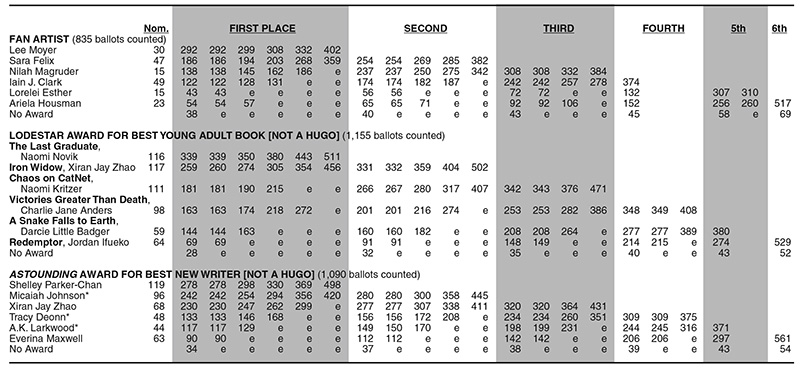
BEST FAN ARTIST
Lee Moyer started in the middle of the pack as far as nominations went, but entered the voting with a big lead in first-place votes and never looked back, winning in six rounds. The rest of the places also went without contest: Sara Felix took second place in five rounds, Nilah Magruder landed third in four rounds, Iain J. Clark (who had the most nominations) slam dunked fourth place in a single round, Lorelei Esther took fifth in two rounds, and Ariela Houseman ended up in sixth place. The closest nominee was Richard Man, just one vote back of the ballot. This was Moyer’s second Hugo nomination and second win, both this year – the other for fanzine Small Gods.
LODESTAR AWARD FOR BEST YOUNG ADULT BOOK (NOT A HUGO)
The Last Graduate by Naomi Novik won easily, leading all the way in six rounds of voting. Iron Widow by Xiran Jay Zhao, which led in nominations, then took second place without significant challenge, and the rest of the places went in similar fashion, with Chaos on CatNet by Naomi Kritzer taking third, Victories Greater Than Death by Charlie Jane Anders snagging fourth, A Snake Falls to Earth by Darcie Little Badger grabbing fifth in a single round, and Redemptor by Jordan Ifueko ending up in sixth place. Along the Saltwise Sea by A. Deborah Baker (a pen name for Seanan McGuire) was the closest runner-up, but would have needed 14 bullet votes to make the ballot. This was Novik’s second Lodestar nomination and first win; she also has four Hugo nominations.
ASTOUNDING AWARD FOR BEST NEW WRITER (NOT A HUGO)
Shelley Parker-Chan started out with the most nominations and first-place votes, and led all the way through six rounds of voting to win. Second place saw a brief contest; Micaiah Johnson led the voting in the first two rounds, then Xiran Jay Zhao took the lead in the third round, only to see Johnson regain the lead in the fourth round and claim second place in the fifth round. Zhao took third place in four rounds without a fight, Tracy Deonn then claimed fourth place in three rounds, and A.K. Larkwood grabbed fifth place in a single round, leaving Everina Maxwell to take sixth place. The closest runner-up was Gautam Bhatia, four bullet votes away from the ballot. This was Parker-Chan’s first year of eligibility.
–Carolyn Cushman
This report and more like it in the October 2022 issue of Locus.
 While you are here, please take a moment to support Locus with a one-time or recurring donation. We rely on reader donations to keep the magazine and site going, and would like to keep the site paywall free, but WE NEED YOUR FINANCIAL SUPPORT to continue quality coverage of the science fiction and fantasy field.
While you are here, please take a moment to support Locus with a one-time or recurring donation. We rely on reader donations to keep the magazine and site going, and would like to keep the site paywall free, but WE NEED YOUR FINANCIAL SUPPORT to continue quality coverage of the science fiction and fantasy field.
©Locus Magazine. Copyrighted material may not be republished without permission of LSFF.





